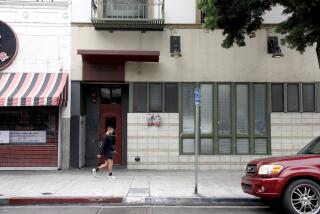Barclays Moves to Fill Gap Left by Valencia
- Share via
The offices of Valencia Bank, which was seized and declared insolvent by bank regulators Friday, were empty yesterday.
But at some branches of Barclays Bank of California, which is handling Valencia’s deposit accounts, customers were lined up all day waiting to get their money or to convert their accounts to Barclays.
“It’s been kind of hectic all day, but in most cases, it’s been real smooth,” said William E. Corcoran, a Barclays senior vice president. “Doing everything by hand, though, is slower than I thought it would be.”
While most of the depositors seemed good-natured about the events, some became upset, he said. “When you’re upset, it’s hard to be tolerant of a slow process,” Corcoran said.
Some Called by Phone
Other Valencia customers called by telephone to be reassured that they can continue to use their Valencia account checks for at least 30 more days and that Barclays will honor them. Corcoran said Barclays may extend that deadline an additional 60 days depending on how quickly customers open new accounts or pull their money out.
San Francisco-based Barclays, which has 10 branches in Orange County and 54 statewide, also is handling some non-deposit customers, particularly escrow customers.
Corcoran said real estate closings for escrow customers should go through without a problem as long as Valencia was not financing the loans. For any escrow with a loan to be financed by Valencia, he said, Barclays would review the matter and decide if it will provide financing, perhaps at a different interest rate.
Barclays also is handling credit card receipts for merchants who had been taking their receipts to Valencia.
Over the weekend, Barclays agreed to pay $251,000 to the Federal Deposit Insurance Corp. for the opportunity to handle the $91.9 million of insured deposits in 10,600 Valencia accounts. Corcoran said he expected that more than 50% of Valencia’s customers would convert to Barclays.
The FDIC, which insures deposits up to $100,000, was appointed receiver of Valencia by the State Banking Department. The federal agency will issue receivers certificates to 46 depositors who have a total of $2.1 million over the $100,000 limit. The certificates will allow them to share in whatever money is left after liquidation. The FDIC said that, on average, it take 7 1/2 years to liquidate a bank.
Agree to Make Payments
Though Barclays received FDIC money for the insured deposits, it also has agreed to pay the FDIC $66.3 million for certain Valencia assets, primarily real estate, commercial and installment loans that are current.
“The attraction (for the deal) was the potential for new customers for our bank,” Corcoran said. “In November, Barclays bought 11 offices of California Canadian Bank. We want to continue to work to strengthen all our branches. These (Valencia customers) are a very nice fit for us.”
Barclays is not taking Valencia’s branches, which were leased.
Despite an unusual delay in getting court approval Monday for a transfer of insured deposits and purchase of assets, Barclays had representatives outside each Valencia Bank branch by 10 a.m. to direct customers to the nearest Barclays branch. They also passed out information on Barclays, a subsidiary of London-based Barclays Bank PLC, which is a worldwide banking organization that boasts 5,000 offices in 80 nations.
The FDIC and Barclays reached their agreement on Saturday, but because it involved the purchase of assets, an Orange County Superior Court judge had to approve the package. Unsure of whether he could rule on a Sunday when they came to him, Judge Robert C. Todd issued a tentative order and told the parties to return at 8:30 a.m. Monday.
Problem With Trust
Todd approved the fund transfer and asset sale the next morning. But a new wrinkle surfaced over a trust created by the $8.2-million settlement of a lawsuit last June over mismanagement of Valencia’s trust department.
Trustee Bruce W. Sumner, a former judge himself, claimed that certain assets belonged to the trust and should not be liquidated by the FDIC or sold to Barclays unless the trust gets the proceeds. The trust, representing pension funds and profit-sharing accounts for about three dozen doctors and their employees, has collected and paid out $7.5 million, including $232,000 in interest, Sumner said. An additional $1.8 million is due the trust, he said.
Todd deferred the issue of who owns the disputed assets to another time, but he said he will sign an order giving the trust 120 days to sell the assets for what it can get before the FDIC takes control of sale efforts. Proceeds from any sale are to be put in interest-bearing accounts until the parties can agree or a court can decide who is entitled to the money. Lawyers were working on the wording of the order late Monday.
“The FDIC has a terrible reputation for taking a long time to do simple things” Sumner said. “We hope to sell the assets quickly to minimize (liquidation) expenses.”
He said the doctors were aware of the bank’s shaky status last spring when they settled the case and named specific assets as part of the trust to avoid losing their money in case the bank went under. The assets are primarily real estate and rights in pending lawsuits Valencia has filed against others.
An FDIC spokesman said the agency simply has not had time yet to determine the elements of the trust.
More Interested in Loans
The agreement between the FDIC and Barclays does not depend on what assets may go to the trust, Corcoran said. Barclays is more interested in the loans, he said.
Ironically, Valencia was opened in December, 1971, by a group of investors that included at least three former Barclays executives. Two of them were Ray L. Smith and Gene W. Hobday, both of whom orchestrated Valencia’s fast growth. Smith was Valencia’s chairman until he retired in April and was the largest stockholder. Hobday was Valencia’s second-largest stockholder and president for 11 years until he quit in 1984, in part, because of a dispute with Smith.
The real estate market dried up, however, and Valencia lost $10.4 million in the last three years, primarily on real estate loans that went sour. Executives made repeated efforts--up to the close of business Friday--to sell the bank, and three deals last year to sell all or part of the bank fell through.
After determining that Valencia had exhausted its capital base, the State Banking Department took over Friday and immediately appointed the FDIC as receiver. Federal examiners worked through the weekend to determine the condition of the bank.
As of the close of business Friday, the examiners determined that Valencia had $96.7 million in assets and $94 million in deposits.
Times staff writer Maria La Ganga contributed to this story.
More to Read
Sign up for Essential California
The most important California stories and recommendations in your inbox every morning.
You may occasionally receive promotional content from the Los Angeles Times.













